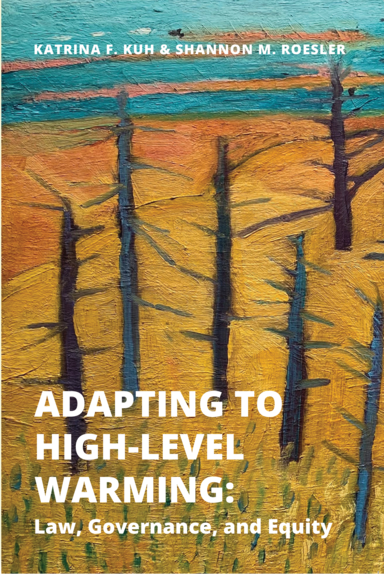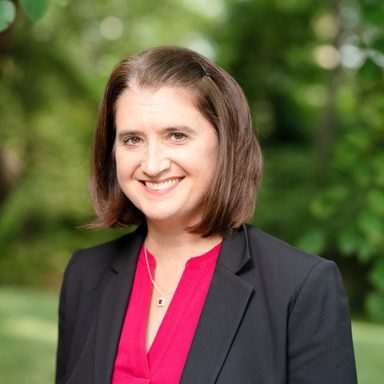
Most legal scholarship assumes a 2°C warming as the upper bound of temperature change, but robust science increasingly tells us a different story: warming beyond 2°C is likely and warming as high as 3°–4°C by the end of the 21st century is a real possibility. Warming of this magnitude would have significant impacts on people, places, and our planet. How can governance systems and institutions adapt today to prepare us for these future shocks? And what will be the general and specific challenges to law and policy? These concerns are the subject of a new book from the Environmental Law Collaborative—a rotating group of law professors who assemble every other year to think, discuss, and write on an important and intriguing theme in environmental law—aptly titled, Adapting to High-Level Warming: Law, Governance, and Equity.
“Efforts to mitigate the devastating consequences of climate change remain parament, but new governance structures will also be needed to address a future shaped by high levels of warming, commented Rachel Jean-Baptiste, ELI’s Vice President for Publications. “Because existing law and policy largely ignore this possibility, the Environmental Law Collaborative took it upon themselves to explore what 4°C might mean for a variety of current legal doctrines, planning policies, governance structures, and institutions.”
The fifth in a series by the Environmental Law Collaborative, Adapting to High-Level Warming begins by identifying and offering solutions to address the mismatch between today’s legal and regulatory systems and the conditions and demands of high-level warming. The next set of chapters imagine more broadly the challenges of effective governance—across a range of laws, through democratic processes—under high-level warming. The book’s concluding chapters focus on equity and justice. Many of the ideas proposed in this book may sound wildly ambitious today but will ultimately appear modest when weighed against the tolls of a superheated climate.

The book, published by ELI Press, the Environmental Law Institute’s book division, is on sale now. Click here to learn more.
Katrina Fischer Kuh, Haub Distinguished Professor of Environmental Law at the Elisabeth Haub School of Law at Pace University, and Shannon M. Roesler, Charlotte and Frederick Hubbell Professor of Environmental and Natural Resources Law and the Faculty Director of the Hubbell Environmental Law Initiative at the University of Iowa College of Law (pictured left), co-edited the volume and contributed chapters to the book.
Other contributing authors include:
- Karrigan BÖrk, Acting Professor of Law at UC Davis
- Karen Bradshaw, Professor of Law at the Sandra Day O’Connor College of Law Arizona State University
- Cinnamon Carlarne, President and Dean at Albany Law School, where she is also a Professor
- Robin Kundis Craig, Robert A. Schroeder Distinguished Professor at the University of Kansas School of Law
- Sarah Fox, Associate Professor at Northern Illinois University College of Law
- Joshua Ulan Galperin, Associate Professor at the Elisabeth Haub School of Law at Pace University
- Michael B. Gerrard, Andrew Sabin Professor of Professional Practice and founder and faculty director of the Sabin Center for Climate Change Law at Columbia Law School
- Keith H. Hirokawa, Distinguished Professor of Law at Albany Law School
- Shi-Ling Hsu, D’Alemberte Professor at the Florida State University College of Law
- Kevin J. Lynch, Associate Professor at the University of Denver Sturm College of Law
- Michele Okoh, Assistant Professor at Lewis & Clark Law School
- Jessica Owley, Professor of Law and Director of the Environmental Law Program at the University of Miami
- Melissa Powers, Jeffrey Bain Faculty Scholar and Professor of Law at Lewis & Clark Law School
- J.B. Ruhl, David Daniels Allen Distinguished Chair of Law at Vanderbilt University Law School
- Jim Salzman, Donald Bren Distinguished Professor of Environmental Law with joint appointments at the Bren School of Environment and UCLA Law School
- David Takacs, Professor of Law at UC Law San Francisco
- Clifford J. Villa, Deputy Assistant Administrator for the U.S. Environmental Protection Agency, Office of Land and Emergency Management, on leave from the University of New Mexico School of Law.
Other books by the Environmental Law Collaborative include:
- Rethinking Sustainability to Meet the Climate Change Challenge
- Contemporary Issues in Climate Change Law and Policy: Essays Inspired by the IPCC
- Beyond Zero-Sum Environmentalism
- Environmental Law, Disrupted.
This release was written by the Environmental Law Institute 1730 M Street NW, Suite 700 Washington, DC 20036. The Environmental Law Institute makes law work for people, places, and the planet. With its non-partisan, independent approach, ELI promotes solutions to tough environmental problems. The Institute’s unparalleled research and highly respected publications inform the public debate and build the institutions needed to advance sustainable development.
